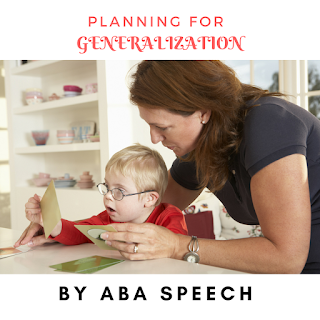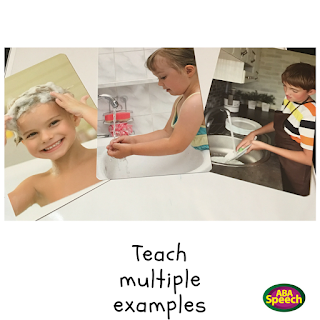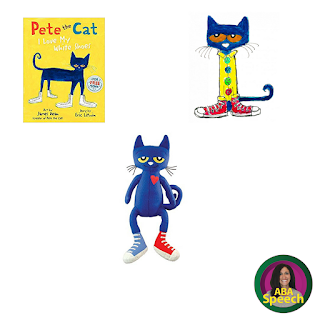with students with autism and/or other complex communication disorders? If so,
planning for the generalization of skills is an essential part of the
intervention process. Generalization can be defined as
which we need to plan for generalization. Today in this post, we will focus on
the generalization of labeling skills.
we should plan for the generalization of skills among people, materials and
environments. With the point being, if the student can only label their
favorite book with the SLP in the therapy room and not with mom when they are
at the local library- generalization of skills has not been addressed.
autism and other complex communication needs with systematic language
instruction, we need to make sure that we are exposing our students to multiple
examples of language targets that we are teaching. We want to make sure that we
aren’t just showing students one static picture each time we work on a labeling
task. If we only present this one picture, chances are the student will not
generalize this skill to other pictured examples or to seeing the item or
action in a less structured setting.
working on expressively labeling the action of washing. Instead of showing
him/her one picture of washing, to teach language more systematically you
should present the child with many examples of the word washing. This may
include washing hands, washing hair and washing dishes. It is important to
point out when we are completing these tasks in the home environment as well.
our services as collaborative as possible. Every situation has potential
barriers to this happening, but I always try my best to make sure that all team
members are aware of and working on the same communication skills that I am
addressing within therapy sessions. When I set up this system, I know that my
student will have more opportunities to practice their skills.
embedded within a learner’s day, it is easier to plan for the generalization of
language skills. If the learner works with the SLP on labeling Pete the Cat (when
shown 3 different pictures of the book or the book itself) in the therapy room
and also works with his teacher and paraprofessional on this skill within the
classroom environment- we have planned for generalization among materials,
environment and people!
able to generalize the language targets they are working on at school or in
therapy into more natural speaking situations. Following this simple tip will
be a great first step to helping your student expand their overall language
skills.
Have a question or comment about generalization? Send me a message at www.abaspeech.org.




0 Comments